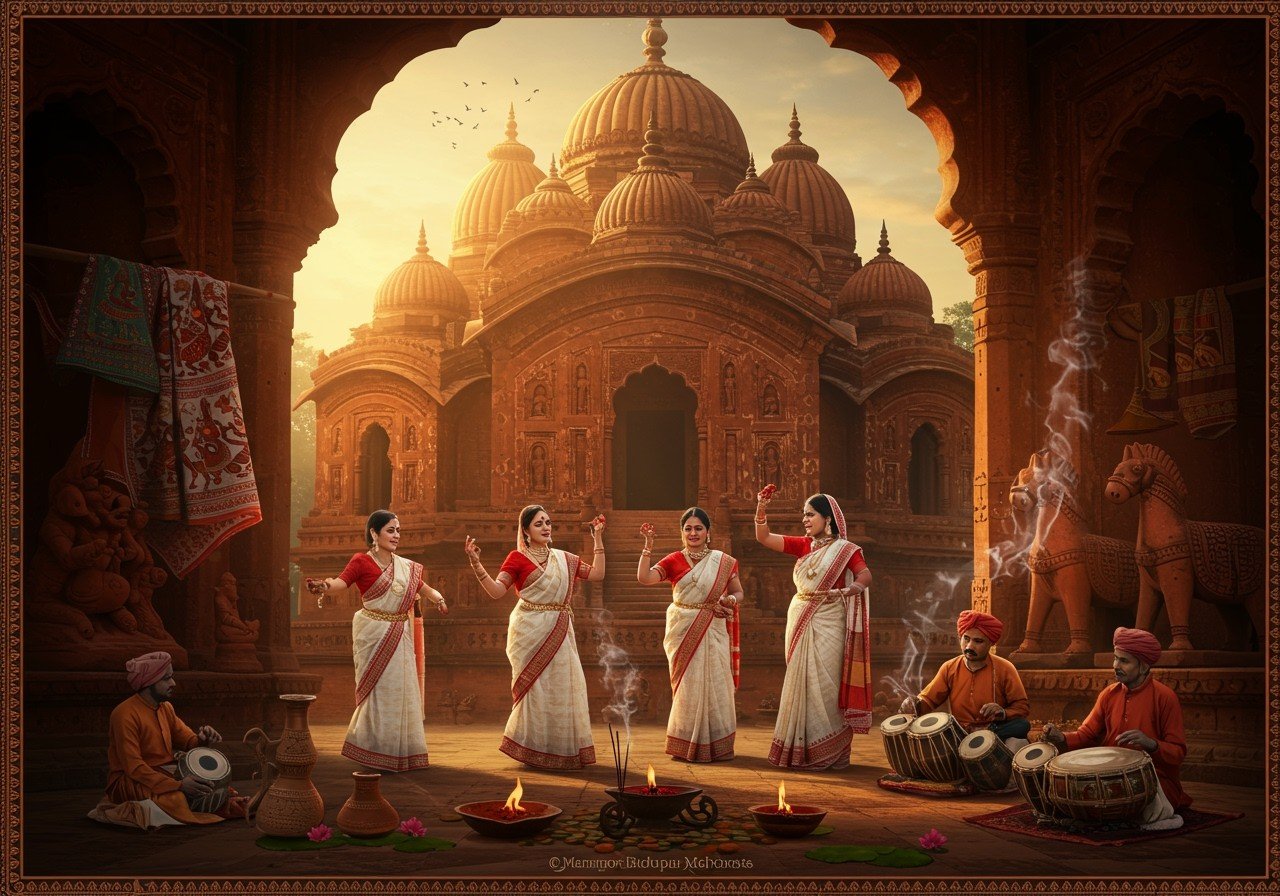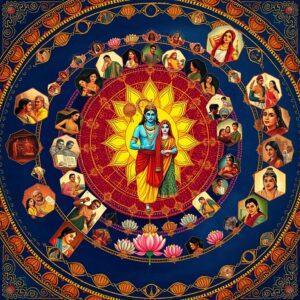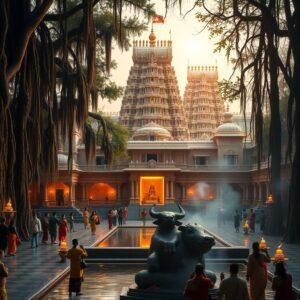
Bishnupur, nestled in the Bankura district of West Bengal, India, is renowned for its rich cultural heritage. Historically known as Mallabhum, or Mallabani, this town boasts a plethora of rituals, traditions, and architectural marvels preserved over centuries. It was the capital of the Malla kings for nearly a thousand years. Let’s delve into the unique aspects of Mallabhum culture, from its magnificent temples and delectable cuisine to the time-honored practices that define Bishnupur.
Historical Background and Cultural Significance
Bishnupur’s history traces back to its time as the capital of the Malla dynasty. These rulers, reigning for nearly a millennium, profoundly influenced the region’s culture, art, and architecture. The very name “Mallabhum” echoes this historical significance within Bengali culture. The Malla kings, patrons of art and culture, fostered the creation of architectural masterpieces and distinctive cultural practices that continue to flourish. Traditions like the reverence of Maa Mrinmoyee, a manifestation of Goddess Durga, and the classical music of the Bishnupur Gharana are integral to the cultural fabric of Mallabhum.
Temples of Mallabhum
Bishnupur is celebrated for its terracotta temples, exquisite examples of the region’s architectural brilliance. Constructed with laterite and brick, and adorned with intricate terracotta carvings depicting scenes from epics and Puranas, these temples are unique architectural marvels. These temples are not merely architectural wonders but also vibrant centers of religious and cultural activities, hosting annual festivals and daily worship. Key temples include:
- Rasmancha: Known for its unique pyramid structure and intricate terracotta carvings. Built by Malla King Bir Hambir in the late 16th century, it stands as a testament to the architectural prowess of the era, serving as a stage for the Ras festival.
- Jor Bangla Temple: Famous for its distinctive twin hut-like design, adorned with exquisite terracotta panels depicting scenes from epics and Puranas. This 17th-century architectural marvel showcases the unique ‘Jor-Bangla’ style, where two thatched huts are joined together.
- Shyam Rai Temple: Notable for its intricate terracotta work, showcasing scenes from epics and daily life. Built in 1643 by King Raghunatha Singha, this temple exemplifies the intricate craftsmanship of the Malla period.
- Madan Mohan Temple: A major center for worship, known for its elegant proportions and terracotta embellishments. This temple, dedicated to Lord Krishna, is a hub of religious activity and a beautiful example of the region’s architectural heritage.
Local Cuisines of Mallabhum
Mallabhum cuisine is an integral part of Bishnupur’s cultural heritage. Traditional ingredients and cooking methods are central to the distinct flavors of this regional cuisine. Local festivals often feature these dishes, reflecting the region’s culinary diversity. Temple offerings also influence local food practices, with prasad (sacred food) being prepared and distributed during religious ceremonies. Popular dishes include:
- Pithe: Sweet rice cakes prepared during festivals, showcasing the region’s culinary creativity and the importance of rice in the local diet. These sweet treats are a staple during festive occasions and religious ceremonies.
- Moya: A traditional sweet made from puffed rice and jaggery, a simple yet delightful treat reflecting the region’s agricultural heritage. Moya is often enjoyed during festivals and special occasions.
- Malpua: A fried sweet pancake often served during religious events, a delectable treat symbolizing prosperity and celebration. Malpua is a popular offering during religious ceremonies and festive gatherings.
Traditional Crafts and Art Forms
Bishnupur is renowned for its traditional crafts, especially terracotta art, Baluchari saris, and pottery. These crafts have historical origins and are closely linked with local rituals. Local artisans play a crucial role in preserving these crafts, their skills showcased during festivals and fairs where handmade items are displayed and sold. These crafts not only provide economic support to the community but also uphold cultural traditions.
- Terracotta Art: Used in temple construction and for creating decorative items. This art form is deeply intertwined with the region’s architectural heritage and religious practices, with skilled artisans crafting intricate designs that adorn temples and homes.
- Baluchari Saris: Known for their intricate designs depicting mythological scenes. These exquisite silk saris are a symbol of the region’s weaving traditions and artistic heritage, passed down through generations of skilled weavers.
- Pottery: Traditional pottery techniques are passed down through generations, creating functional and decorative pieces that reflect the region’s artistic sensibilities and daily life. These pottery traditions are integral to the cultural identity of Bishnupur.
For those seeking to incorporate the spiritual essence of Mallabhum into their homes, Poojn.in offers a diverse collection of sacred items. From intricately crafted terracotta idols and traditional brass deities to temple-style idols perfect for home shrines, you can find authentic representations of revered figures. We also offer sacred idols specifically for festivals and ceremonies, ensuring you have the appropriate spiritual tools for every occasion. Explore our collection of Maa Lakshmi idols and Shiva Lingams today.
Festivals and Rituals
Bishnupur’s calendar is rich with festivals that reflect its cultural vibrancy. Music and dance are integral to these celebrations. The Bishnupur Gharana of classical music is particularly renowned for its unique style. These festivals foster community bonding and preserve cultural continuity. Major festivals include:
- Durga Puja: The worship of Goddess Durga, celebrated with grand processions, elaborate idol immersions, and community feasts. Durga Puja is a major highlight of Bishnupur’s cultural calendar, bringing the community together in celebration.
- Rash Yatra: A vibrant celebration involving chariot processions, devotional songs, and traditional dance performances. Rash Yatra is a colorful and lively festival honoring Lord Krishna and Radha.
- Bishnupur Mela: A bustling fair showcasing local crafts, music, and dance, providing a platform for local artisans and performers to share their talents and traditions. The Bishnupur Mela is a vibrant hub of cultural exchange and celebration.
Preservation and Promotion of Mallabhum Culture
Local authorities and cultural organizations are actively engaged in preserving Bishnupur’s heritage. Community involvement is essential in these preservation efforts. Local artisans and residents play a key role in maintaining cultural practices while adapting to modernization. Initiatives include:
- Tourism Promotion: Encouraging visitors to explore the town’s rich culture through guided tours, heritage walks, and cultural programs. This initiative aims to share the unique heritage of Bishnupur with a wider audience while supporting the local community.
- Cultural Education: Schools and workshops teach traditional crafts and practices, ensuring the transmission of knowledge and skills to future generations. This educational focus helps preserve the intangible cultural heritage of Mallabhum.
- Museums and Heritage Walks: Showcasing Mallabhum traditions through guided tours, interactive exhibits, and curated collections, providing visitors with an immersive experience of the region’s history and culture. These initiatives offer valuable insights into the rich heritage of Bishnupur.
Conclusion
Bishnupur, steeped in the profound traditions of Mallabhum culture, stands as a testament to India’s rich heritage. The town’s temples, cuisines, crafts, and festivals offer a captivating glimpse into centuries-old practices that continue to thrive. As you journey through Bishnupur, you’ll not only marvel at architectural wonders and savor delectable local dishes but also connect with the very essence of Mallabhum culture. The ongoing efforts to preserve and promote these traditions ensure that Bishnupur remains a cherished destination for cultural exploration. Embrace the warmth and hospitality of this historical town, and allow its vibrant heritage to enrich your understanding of India’s diverse cultural tapestry. Read more about Durga Puja celebrations and explore other spiritual journeys on our blog.
FAQs about Mallabhum Rituals and Traditions
What makes Mallabhum rituals significant? Mallabhum rituals are deeply rooted in tradition and cultural heritage. They represent the spiritual beliefs and practices of the people of Bishnupur, passed down through generations, honoring their gods and ancestors. These rituals are integral to the social fabric of the community, fostering a sense of belonging and shared identity. Explore sacred conch shells used in these rituals.
How do Mallabhum traditions influence local cuisines? Mallabhum traditions greatly influence local cuisines, with dishes like Muri Ghonto, Chanar Dalna, and Patishapta prepared using traditional methods and ingredients, reflecting the rich cultural heritage of the region. The use of local spices, seasonal vegetables, and traditional cooking techniques creates a unique culinary experience that is deeply connected to the cultural identity of Mallabhum. Discover pure Aguru, a traditional ingredient used in Mallabhum.
Are there specific festivals celebrated in Bishnupur? Yes, Bishnupur celebrates several festivals, including Durga Puja, Ras Utsav, and Bishnupur Mela. These festivals showcase the vibrant culture and traditions of Mallabhum through music, dance, religious ceremonies, and community gatherings. They offer a window into the rich cultural heritage of the region and provide opportunities for visitors to experience the vibrant traditions firsthand.


